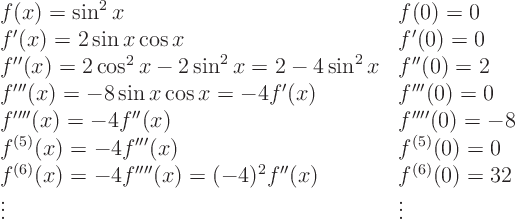| Analysis in Mechanical Engineering |
|
© Leon van Dommelen |
|
Subsections
3.2 Example
From [1, p. 402, 10b]
Asked:
The Maclaurin series of  .
.
3.2.1 Identification
General Taylor series:
This is a power series ( is a given constant.) Maclaurin series:
is a given constant.) Maclaurin series:

 0.
0.
Approach:
- note that

 0;
0;
- identify the derivatives;
- evaluate them at

 0;
0;
- put in the formula;
- identify the terms for any value of
 .
.
3.2.2 Results
General expression:
3.2.3 Other way
Write 

 and look up the
Maclaurin series for the cosine. (No fair.)
and look up the
Maclaurin series for the cosine. (No fair.)
![]() .
.




![]()
![]()
![]() and look up the
Maclaurin series for the cosine. (No fair.)
and look up the
Maclaurin series for the cosine. (No fair.)